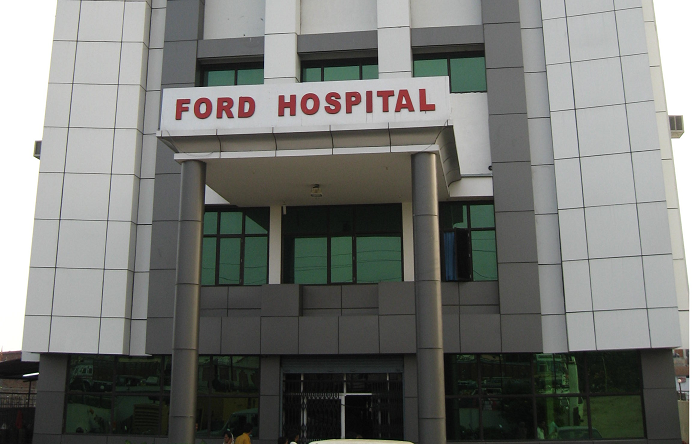
Fertility hospitals are specialized medical facilities that provide diagnosis and treatment for conditions related to infertility. Infertility can be a significant challenge for couples trying to conceive, and it can affect both men and women. Fertility hospitals have a team of experienced medical professionals who are dedicated to providing the highest quality of care to their patients.

At Nirog Hospitals, we provide the most reliable and comprehensive healthcare in Patna A multispeciality 54-bed hospital, established in the 2021

Lead by the vision of Late. Dr. Prabhat Kumar of establishing state of the art treatment facility in Bihar. Dr Prabhat memorial hiramati hospital initiated by Alumni of AIIMS,New Delhi

Mediversal Group is led by a team of Healthcare Experts, Management Professionals, Technologists, highly experienced Doctors and Nurses. We are aiming to build a chain of Hospitals and Health Centres

We Ford Hospital are one of the most reputed hospitals of Patna, Bihar. This is a 105 -bedded multi-specialty hospital, which is located in a prime area of Patna on a wide road easily approachable from rest of near by areas.
At hospitalsinpatna.com, we understand the importance of finding the right Fertility Hospital in Patna. That is why we have compiled a list of some of the best hospitals in the city that specialize in fertility services. Our list includes hospitals that have state-of-the-art facilities and equipment for the diagnosis and treatment of infertility.
The Fertility Hospitals on our list provide a range of services, including diagnostic tests, surgical procedures, and fertility treatments such as IVF (In Vitro Fertilization), IUI (Intrauterine Insemination), and fertility preservation. The medical professionals at these hospitals have expertise in handling all types of infertility conditions and are committed to providing personalized care to their patients.
The hospitals on our list use the latest technology and evidence-based practices to ensure the best outcomes for their patients. They also have a comprehensive follow-up system in place to ensure that patients receive the necessary care and support after they leave the hospital.
Our directory is easy to navigate, and we provide detailed information about each hospital's location, contact details, and services. Whether you are struggling with infertility or looking for fertility preservation options, our directory will help you find the right Fertility Hospital in Patna to meet your needs.
In conclusion, infertility can be a challenging condition that affects many couples. At hospitalsinpatna.com, we have compiled a list of the best Fertility Hospitals in Patna that provide comprehensive care to their patients. We hope that our directory will help you find the right hospital in Patna to receive the highest quality of care for your fertility needs.
Fertility Hospitals In Patna
A fertility hospital is a specialized healthcare facility that provides diagnosis, treatment, and management of infertility and reproductive disorders in men and women.
Fertility hospitals provide a range of services including fertility assessments, ovulation induction, intrauterine insemination (IUI), in vitro fertilization (IVF), intracytoplasmic sperm injection (ICSI), fertility preservation, egg and sperm donation, and gestational surrogacy.
Infertility can be caused by various factors such as age, hormonal imbalances, structural abnormalities, genetic factors, lifestyle factors, and environmental factors.
You may consider visiting a fertility hospital if you have been trying to conceive for more than a year without success or if you have a known reproductive disorder or medical condition that can affect fertility.
Infertility can be diagnosed through various tests and evaluations such as medical history review, physical examination, blood tests, imaging tests, semen analysis, and specialized tests for women such as hysterosalpingogram and laparoscopy.
In Vitro Fertilization (IVF) is a fertility treatment that involves fertilizing an egg with sperm outside the body in a laboratory and then transferring the resulting embryo into the uterus.
The success rate of IVF varies depending on several factors such as age, underlying medical conditions, and the quality of the embryos. On average, the success rate of IVF is around 30% to 40% per cycle.
Like any medical procedure, fertility treatments come with some risks and potential complications such as multiple pregnancies, ovarian hyperstimulation syndrome (OHSS), and ectopic pregnancy. However, these risks can be minimized through careful monitoring and management by fertility specialists.
Yes, lifestyle factors such as smoking, alcohol consumption, drug abuse, and obesity can significantly affect fertility in both men and women. Maintaining a healthy lifestyle and avoiding unhealthy habits can improve the chances of conception and the success of fertility treatments.
Fertility preservation refers to methods and techniques used to preserve fertility in men and women who may face the risk of infertility due to medical treatments such as chemotherapy or radiation therapy. Fertility preservation options may include egg or sperm freezing, embryo freezing, or ovarian tissue freezing.
What is infertility
Infertility is defined as the inability to conceive after one year of regular, unprotected sexual intercourse.
What are some common causes of infertility in women
Common causes of infertility in women include problems with ovulation, blockages in the fallopian tubes, endometriosis, polycystic ovary syndrome (PCOS), and age-related decline in fertility.
What are some common causes of infertility in men
Common causes of infertility in men include low sperm count, poor sperm motility or morphology, blockages in the reproductive tract, hormonal imbalances, and genetic factors.
What is in vitro fertilization (IVF)
In vitro fertilization (IVF) is a fertility treatment where eggs are retrieved from the woman's ovaries and fertilized with sperm in a laboratory. The resulting embryos are then transferred to the woman's uterus.
What is intrauterine insemination (IUI)
Intrauterine insemination (IUI) is a fertility treatment where washed and concentrated sperm are inserted directly into a woman's uterus using a thin catheter.
What is a hysterosalpingogram (HSG)
A hysterosalpingogram (HSG) is a diagnostic test used to evaluate the condition of a woman's fallopian tubes and uterus. During the test, a dye is injected into the uterus and X-rays are taken to check for blockages or abnormalities.
What is a semen analysis
A semen analysis is a test used to evaluate the quantity and quality of a man's sperm. The test measures the sperm count, motility, and morphology, which can help identify potential causes of male infertility.
What is ovarian reserve testing
Ovarian reserve testing is a series of tests used to evaluate a woman's egg quantity and quality. These tests can help predict the likelihood of success with fertility treatments and can inform decisions about timing and type of treatment.
What are some lifestyle factors that can impact fertility
Lifestyle factors that can impact fertility include smoking, excessive alcohol consumption, drug use, obesity, and certain environmental exposures.
Can fertility be treated or cured
Fertility can be treated in many cases, but it cannot always be cured. Treatment options may include medication, surgery, assisted reproductive technologies (ART), or a combination of these approaches. The success of treatment depends on the underlying cause of infertility and other factors, such as age and overall health.
What is ovulation induction
Ovulation induction is a type of fertility treatment that uses medication to stimulate the ovaries to produce more eggs, increasing the chances of successful conception.
What is a follicle-stimulating hormone (FSH) test
A follicle-stimulating hormone (FSH) test is a blood test used to measure the levels of FSH in a woman's body. High levels of FSH can indicate diminished ovarian reserve, which can make it more difficult to conceive.
What is a luteinizing hormone (LH) test
A luteinizing hormone (LH) test is a blood test used to measure the levels of LH in a woman's body. LH is responsible for triggering ovulation, so measuring LH levels can help determine the optimal time for conception.
What is endometrial receptivity analysis (ERA)
Endometrial receptivity analysis (ERA) is a diagnostic test used to evaluate the receptivity of the uterine lining to embryo implantation. The test involves taking a small biopsy of the uterine lining and analyzing the gene expression patterns to determine the best time for embryo transfer.
What is pre-implantation genetic testing (PGT)
Pre-implantation genetic testing (PGT) is a procedure used during in vitro fertilization (IVF) to test embryos for genetic abnormalities before they are transferred to the uterus. PGT can help reduce the risk of passing on genetic disorders to future children.
What is surrogacy
Surrogacy is a type of assisted reproduction where a woman carries a pregnancy for another person or couple. The surrogate may be genetically related to the child (traditional surrogacy) or not (gestational surrogacy).
What is donor sperm
Donor sperm is sperm that is provided by a sperm bank or donor for use in fertility treatments. Donor sperm may be used in cases where the male partner has a low sperm count, poor sperm quality, or genetic disorders.
What is donor egg
Donor egg is an egg that is provided by an egg donor for use in fertility treatments. Donor eggs may be used in cases where the female partner has a low ovarian reserve or genetic disorders.
Increasing your hospital's visibility the leading directory listing platform for hospitals in Patna